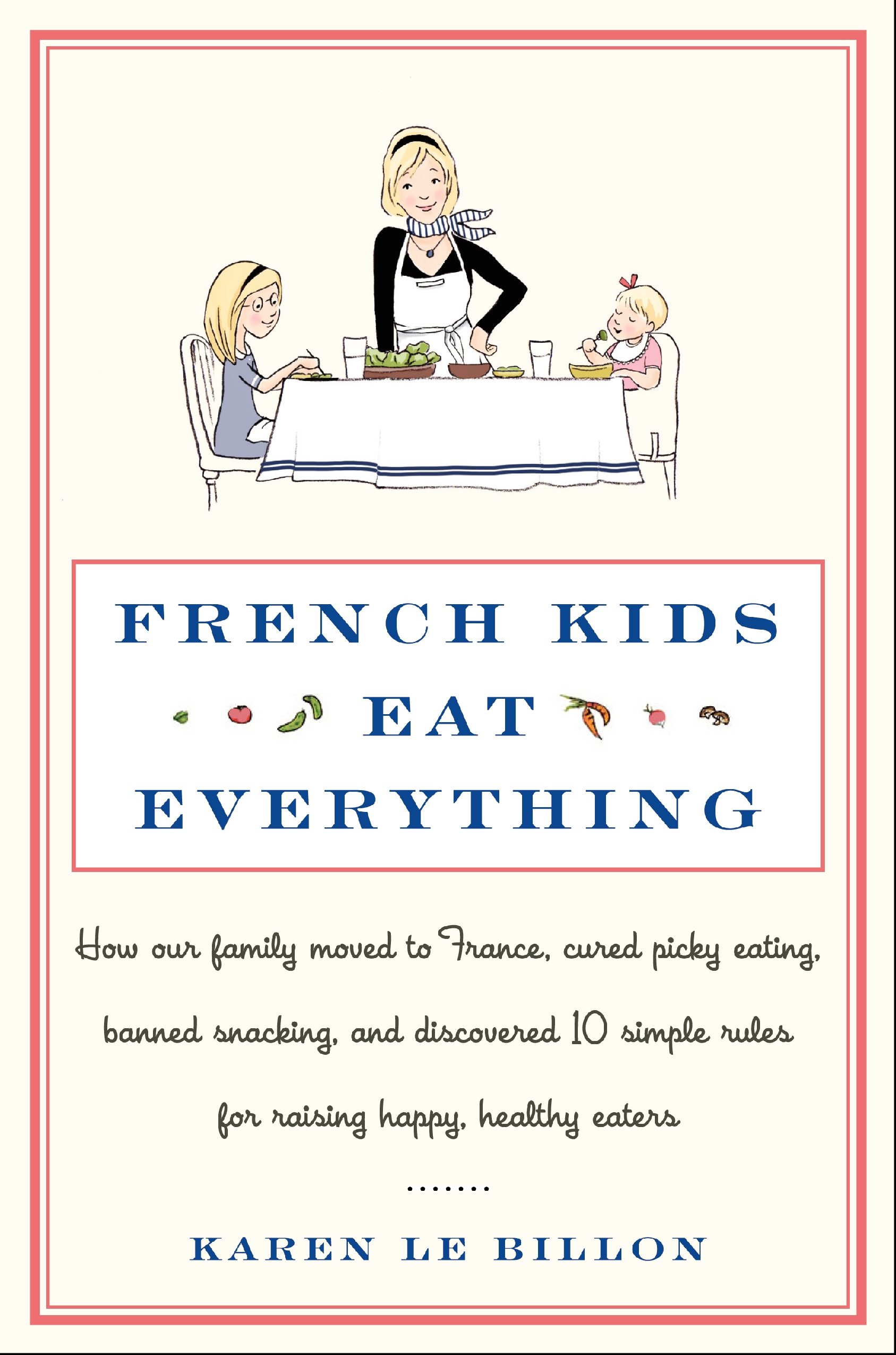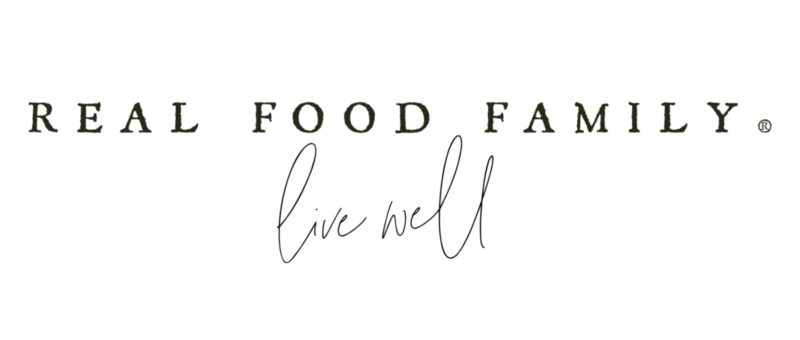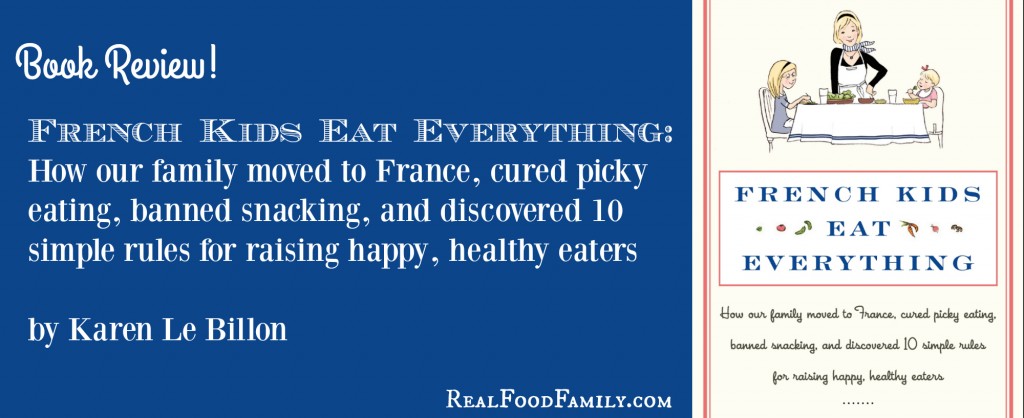I tend to be drawn to perspectives that fly in the face of mainstream thought and norms. When I found French Kids Eat Everything: How Our Fmaily Moved to France, Cured Picky Eating, Banned Snacking and Discovered 10 Simple Rules for Raising Happy, Healthy Eaters by Karen Le Billon, I added another notch in my “alternative health lifestyle” belt, adopting many of the French food and eating “rules”, which are a dramatic contrast to typical American health recommendations. Within a day of beginning to read this book, I changed my entire approach to how I feed my family. Though we had initial struggles adopting the French approach to our family’s “eating culture”, the changes we’ve made have been extremely beneficial, relieving much of the stress and frustrations we deal with at meal times.

To summarize, the author is an American woman married to a French man, and they have two daughters under five years old. They move from Vancouver, Washington, to a quaint French village where the husband is from. The woman is astounded at the cultural differences and is surprised to find that much of French culture revolves entirely around food and eating. There are many unwritten rules French families follow and the author finds herself frustrated, feeling judged and looked down upon for her sloppy and undistinguished American food and eating habits. She resisted the “French ways” at first, but soon delved into understanding them and adopting them for her family. Through trail and error, she shares her story and encourages readers to see the benefits of the way the French enjoy food and eating. She outlines her 10 discovered “rules” of French food and eating culture.
I fell head over heels for the “French way” described in this book and adopted the French “rules” immediately. As I started implementing what I was learning from the book, my children protested: “but I don’t want to eat French!” Some of the rules that were a big change for us were sticking to strict eating time and NO snacking in between these times. Also, we no longer use food as a bargaining chip or reward (“if you clean your room you can have a cookie”, or “if you misbehave you can’t have dessert tonight”). Though the French “rules” are strict, children are not forced to eat anything and can earn dessert at every meal depending on how much they choose to eat of the main dish served. It didn’t take long for our girls to embrace these new French rules because meals are now more exciting and, no matter what anyone tries to tell me, children love routine and therefore respond well to specifically planned meal times. They have grown particularly fond of the comfort foods they can expect to be served at afternoon snack time every day.
There are simply too many truths and evidences to prove that the French really know what they’re doing when it comes to food and eating. Years ago it was termed the “French Paradox”: the fact that the French are less overweight, rarely obese and have lower rates of heart disease than Americans despite the large quantities of butter, pork, cheese and wine in their typical meals. The French have one of the lowest national obesity rates in children and obese adults are a rarity. As for the no-snacking rule and strict meal times, I know as a Nutritional Therapy Practitioner the health benefits of eating balanced meals and fasting in between meals. I fully reject the concept of snacking on small meals throughout the day- “healthy” or not- as typically recommended by American health professionals. The French culture has adhered to strict meal times with no snacking in between for hundreds of years, and their superior health statistics prove they are probably not wrong about this.
The French place high value on a person’s ability to eat well since they understand this will lead to health, happiness, success and longevity. This is a stark contrast to the American norm of prioritizing academic or sports success and accomplishment, with diet being something families can choose to prioritize or not. I have observed that most American families “try to eat well”, but don’t consider food and eating to be a top priority in the family. Many Americans may even be offended at the concept that food should be this important, however since I understand how food and eating influences virtually every area of life and living, not just nutrition and physical health, I fully appreciate the French perspective and agree that we Americans are messed up in how we prioritize food and eating.
One of the author’s first observations and realizations that the French food culture was possibly superior than the American way was the fact that the French children ate everything they were served and did not revolt and beg for typical “kid food”. This struck a chord with her since her children, like most American children, were only interested in things like pasta, pizza, hot dogs, toast and other nutrient-deficient staples. Her older daughter, like many American children, was particularly picky and demanded things like ketchup and Parmesan with every meal, which was repulsive to the author’s French family and friends. The French view developing a taste for many different foods as an important part of a child’s development and education.
The French introduce various foods to their children beginning in infancy, and they ensure a vast array of foods are circulated throughout the diet. French psychologists and nutritionists discovered that taste has to be developed with at least seven to fifteen exposures to different foods before a child will willingly agree to eat them. With this perspective, the concept of a child (or adult) getting to taste a food once and have an opinion about it is UNACCEPTABLE! French children are expected to taste whatever they are served, however children aren’t forced to eat anything and fights over food are rare. Food is never a bargaining tool or reward, either. Emotional attachments to food is a major part of American food culture but is nonexistent in France (except for passionate emotions about food). I would agree that emotional attachment to food leads to impulsive eating and eating disorders.
“Though the French approach to food education is highly structured, these are not rigid regulations. Rather, they’re more like commonsense routines, or social habits: unwritten and often unspoken, but collectively accepted.”
Of course parenting styles and discipline play a part in our cultural differences. The French are generally more strict and disciplined in their parenting approach, compared to Americans. They are not less loving, though. As a parent who discovered that a less disciplined approach to parenting was ruining my health and our families happiness, I very much appreciate a more traditional and disciplined approach to parenting. Since reclaiming control and authority as a parent in my own home and setting clear and strict boundaries with my children, there is more room for peace, affection, love and respect. My ability to establish new rules about eating in our home was relatively simple since my children now respond obediently to rules that I set in place. However, these “rules” are not dictations like, “you have to eat everything on your plate or you get a spank”, or “if you don’t eat what I serve you will go to bed without dinner and starve!!” Sadly, many people view disciplined parenting styles as dictatorships, however I believe discipline creates a more peaceful parent-child relationship.
Our new French eating “rules” are more like boundaries and behavioral expectations when it comes to how we eat, such as meal times and no snacking, the requirement to taste everything without complaining, the expectation to be thankful for food and practice enjoying the fun of trying new things and experience our complex human sense of taste, and the expectation to maintain table manners and etiquette. We are honestly having more fun and more peace at meal times since adopting these “rules”. One reason we are having so much success is because we are trying to adopt more of the passion French people have for food and eating. Food is considered more of an extremely pleasurable social activity to look forward to during the day instead of a frustratingly nutrition-focused time to rush through. To the French, “eating- even every day meals- is treated like an occasion”.
I have thoroughly enjoyed adopting an even deeper passion for eating delicious, satisfying foods of many different kinds at every meal. I’ve been challenged to add a greater variety of foods (mainly more kinds of vegetables) while also relaxing about being perfectly nutritious with every meal. I am more focused on the pleasure of eating delicious whole foods and meals made from scratch. For instance, instead of escaping to our local bakery and eating a decadent French pastry and shaming myself for indulging in such an unhealthy delight, I make the decision to make an occasion of venturing to the local bakery every so often and enjoying the decadent pastry as my breakfast meal- savoring every pleasurable bite without any emotion or judgement attached except my emotion about how much I enjoy the pastry.
I truly believe that a healthier diet and lifestyle is focused less on nutrition and more on the pleasure of eating well-prepared food made with superior, quality ingredients, as well as having the discipline of eating strictly at meal times and getting daily exercise. The French actually care LESS about nutrition than Americans, yet they are eating more nutritiously and enjoying food much more than us.
 This book has made a significant impact on the way our family now eats, however I don’t fully embrace everything about French food and eating culture, particularly when it comes to feeding infants. The French do not generally breastfeed very long and reject the idea of feeding infants on command, with the intent of conforming babies to French “rules” as early as possible. I fully believe in long-term breastfeeding and feeding infants on command since during at least the first year of life, breastfeeding is not only about feeding but about nurturing, soothing and bonding. I believe this is a time in life where emotional attachment to eating is fully justified, and there is plenty of research and evidence to prove the nutritional, developmental and psychological benefits of long term breastfeeding on command. However, I have personally found that as a child becomes an older toddler, breastfeeding times can begin to revolve around meal times and become more scheduled. The French way can easily be adopted as the child begins to eat solid foods and I have found this to be an easy transition for my children.
This book has made a significant impact on the way our family now eats, however I don’t fully embrace everything about French food and eating culture, particularly when it comes to feeding infants. The French do not generally breastfeed very long and reject the idea of feeding infants on command, with the intent of conforming babies to French “rules” as early as possible. I fully believe in long-term breastfeeding and feeding infants on command since during at least the first year of life, breastfeeding is not only about feeding but about nurturing, soothing and bonding. I believe this is a time in life where emotional attachment to eating is fully justified, and there is plenty of research and evidence to prove the nutritional, developmental and psychological benefits of long term breastfeeding on command. However, I have personally found that as a child becomes an older toddler, breastfeeding times can begin to revolve around meal times and become more scheduled. The French way can easily be adopted as the child begins to eat solid foods and I have found this to be an easy transition for my children.
I encourage all families to read this book and understand the benefits of French food and eating culture. You may notice that I call it “food and eating culture” since the French way is not only about what you eat, but how you eat. The French have had many centuries to develop their culture, while Americans have only had a little over 200 years. American health statistics are staggering, and I believe it should be more important that American parents prioritize the way our children eat. Of all the countries and cultures of the world, the French seem to enjoy food the most. The French consider good food to be a basic human right- available to the rich and poor. Their national health statistics prove that they have their priorities in the right place. While I’m proud to be an American and wouldn’t exchange my unique American freedom for anything, I’m happy to become “French” when it comes to food and eating.
Thank you Karen de Billon for writing this book! I hope it impacts the health and happiness of many families across the world.



